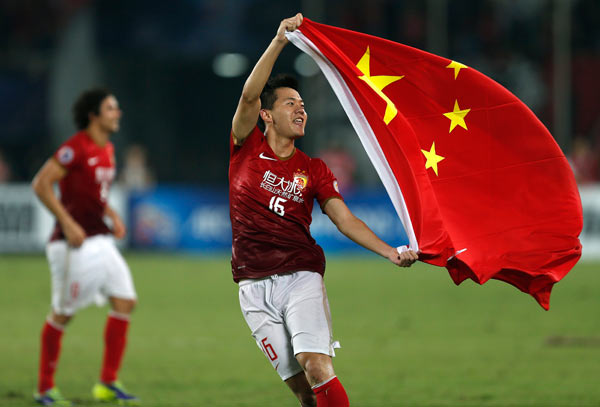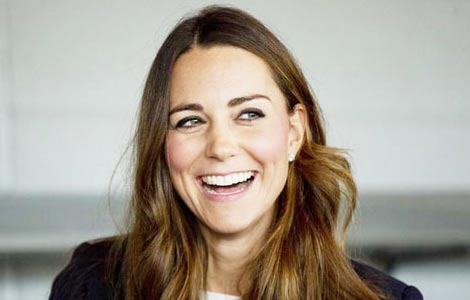Money isn't everything in success of nation's team
Updated: 2013-11-10 22:59
By Qiu Quanlin in Guangzhou and Lei Lei in Beijing (China Daily)
|
|||||||||
Experts say introducing professional approach key to Chinese soccer
|
 |
|
Huang Bowen (16) of China's Guangzhou Evergrande celebrates with the national flag after winning the AFC Champions' League at Tianhe stadium in Guangzhou on Saturday. Bobby Yip / Reuters |
Building a profound soccer culture and introducing a professional approach to club management — and not simply spending money to buy big-name players — are important to the future development of Chinese soccer, insiders said after big-spending Guangzhou Evergrande won the AFC Champions League on Saturday.
"A hefty investment in building a strong international squad and a professional approach to club management were major factors behind Evergrande's success in Asian soccer. But it is a hard example for all Chinese clubs to follow," said Xie Liang, a veteran soccer commentator with Radio Guangdong.
Guangzhou Evergrande rewrote the country's two-decade soccer history by winning the AFC Champions League with a 1-1 tie against South Korean champion FC Seoul on Saturday in Guangzhou, Guangdong province, because of the "away goals rule". Under the rule, the team that scores more goals away from home will win if the scores are otherwise tied.
The game drew huge attention nationwide — CCTV broadcast part of it live during Xinwenlianbo, the most-watched news program in China.
China last had a championship in 1990, when Liaoning lifted the trophy of the now-defunct Asian Club Championship.
Local real estate giant Evergrande took over the Guangzhou club three years ago and then started spending on building a strong team.
Besides getting many players who were on the Chinese national team, the Evergrande team introduced a number of international players and coaches — including South Americans Dario Conca, Muriqui and Elkeson, and World Cup-winning coach Marcello Lippi — over the past three seasons.
But despite Evergrande's success, simply pouring money into buying big international names in the domestic league will not help boost Chinese soccer development in the long term, soccer insiders said.
"The triumph of Evergrande in the Asian Football Confederation shows there's hope for China's soccer," Zhang Jilong, AFC senior vice-president, was quoted as saying by Xinhua. "The big investment from the club contributed a lot to China's soccer in recent years, but we can't say it's the only pattern of development for Chinese soccer."
Evergrande's big spending "might lead club sponsors to make unrealistic comparisons, which is not good to the healthy development of Chinese soccer. The example of Evergrande is exciting for China's soccer, but we have to calm down after the victory to see the pluses and minuses and seek reform. The impact of this single club should go to all Chinese soccer and society gradually."
Most fans agreed.
In an online survey by ifeng.com on "What do you think of Evergrande's AFC victory?", 37.9 percent of the more than 230,000 respondents said they were "cautiously optimistic since one victory cannot hide the dark side of China's soccer", while 24.97 percent agreed that "Evergrande is an example of China's professional soccer since the team boosted the morale of Chinese soccer". Another 17.54 percent considered it a type of "money soccer, which cannot be learned by others".
Chinese soccer clubs have frequently changed their investors and sponsors due to financial problems and a decadelong scandal involving game fixing and gambling after the country launched a professional league some 20 years ago.
"Apart from its huge investment, Guangzhou Evergrande's success also comes from a professional operation, including a scientific training system, after bringing in a coaching squad from Italy and a series of incentives to boost players' motivation," said Zhou Sui'an, who led the then-Guangzhou side to second place in China's top league in 1994.
"Other Chinese clubs cannot buy big stars as Evergrande did in the past few years, but they can follow the professional management style. In the past, most Chinese clubs failed to develop professional soccer, which has led to a devastating performance for the Chinese national team," Zhou added.
However, foreign experts said a big investment is the first step to success.
Sven-Goran Eriksson, the internationally renowned head coach of Chinese Super League club Guangzhou R&F, said a huge investment from Chinese clubs in the past years had helped boost development of Chinese soccer.
"For example, big investments in a good coach and several international and domestic star players have increased Evergrande's presence in international competition," said Eriksson.
Evergrande, which secured triple wins in the domestic league, could also be able to compete in Europe due to its increased investment to develop a strong international squad, Eriksson said.
Youth is the future
Pouring out large sums of money to buy big names is not the only thing that Evergrande did in past years. Evergrande's soccer school, a cooperative project with La Liga giant Real Madrid, started last year.
Located in Qingyuan, in northern Guangdong province, the school will include 2,400 more students this year.
Commentator Xie said the success of Guangzhou Evergrande both in the domestic league and Asian competition will encourage more young people to play soccer.
"Only by getting a large majority of young people involved in soccer can China's soccer catch up with international soccer powers in the future," said Xie, who has been covering reports of Chinese soccer since the top domestic league was launched some 20 years ago.
Contact the writers at qiuquanlin@chinadaily.com.cn, leilei@chinadaily.com.cn

 Post-baby Duchess
Post-baby Duchess
 Victoria Beckham S/S 2014 presented during NYFW
Victoria Beckham S/S 2014 presented during NYFW
 'Despicable' minions upset Depp's 'Lone Ranger' at box office
'Despicable' minions upset Depp's 'Lone Ranger' at box office
 'Taken 2' grabs movie box office crown
'Taken 2' grabs movie box office crown
 Rihanna's 'Diamonds' tops UK pop chart
Rihanna's 'Diamonds' tops UK pop chart
 Fans get look at vintage Rolling Stones
Fans get look at vintage Rolling Stones
 Celebrities attend Power of Women event
Celebrities attend Power of Women event
 Ang Lee breaks 'every rule' to make unlikely new Life of Pi film
Ang Lee breaks 'every rule' to make unlikely new Life of Pi film
Most Viewed
Editor's Picks

|

|

|

|

|

|
Today's Top News
Thousands rally over Kimmel show remark
SOE reforms to be launched
'Singles Day' to see big spenders
Launch zone challenges
CPC session begins to set reform agenda
Economic growth to continue
Super typhoon kills over 10,000
World powers, Iran to hold news nuclear talks
US Weekly

|

|







